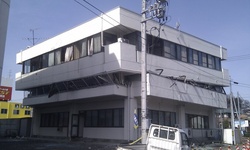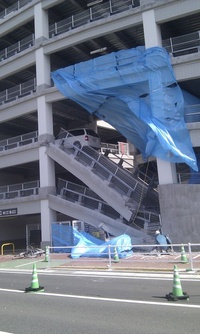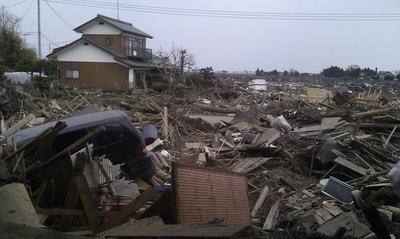As I write this latest entry to the Great Tohoku Disaster (there is a lot more to come), I do so after the 7.1 magnitude aftershock of the March 11th earthquake and tsunami that has changed the Tohoku Region of Japan forever. “How much more can those people take?” I wonder.
Getting new news about Japan is becoming more and more difficult as the possibility of a nuclear disaster diminishes and the attention deficit-suffering media shifts its focus on to newer sensations, disaster and circuses around the world.
It’s hard not to be cynical about the media and its priorities at times like these. When I picked up the Toronto Star yesterday (Friday, April 8th), there wasn’t a mention about the situation in Japan. The CBC TV coverage (in Canada) is virtually nonexistent, except for a brief report about the 7.1 magnitude aftershock that struck on April 7th. We Canadians have treated this grave situation with a shameful lack of compassion.
Now, if you want to point a finger at someone to blame, Prime Minister Naoto Kan’s Minshuto (Democratic Party) government should be first to be called to account. Wasn’t he the one who initially told different countries that their assistance was not needed?
Having lived in Sendai for eight years and travelled Tohoku Region extensively, I know the area well and have a “feel” for the dear, sweet, stoic people there who it would pain to ask for anything for themselves even at a time like this.
What would I have done had I been living in Sendai on March 11th? I have little doubt that I would be working alongside my friends Senji and Shogo and the other courageous foreigners in Tohoku who, like Christopher Nicholls, a JET English teacher from England, chose to stay to help rather than flee to the safety of their home countries.
* * * * *
My name’s Christopher Nicholls, I’m 28 years old and originally from the south of England. I grew up in a small village called Clanfield, which is just outside Portsmouth. For the last 5 years of my life before coming to Japan though, I lived in a city called Brighton, which is a little further down the coast.
Why did you decide to become an ALT in Japan?
After working in an office for 5 years after university I realized that I wanted more. I wanted adventure and to see more of the world and as Japan is an intriguing country that had always fascinated me, and as I’d never been there or to Asia even, I decided one day that I wanted to live and work there. I then set about gaining a teacher training qualification (CELTA) and applied for JET which I’m very pleased that I got on as I think it’s a great way to experience Japan and all its wonders.
I’ve been in Japan since August 2010 and am an assistant language teacher at a junior high school and 5 elementary schools as part of the JET Programme. My home was shaken very badly and everything that wasn’t strapped down—which was everything I own—was thrown about the place. Aside from some broken dishes and glasses though all my things were okay, and my building wasn’t damaged. There are many cracks and large dips and bumps along my street and the surrounding areas. There are also a few buildings around that didn’t stand up to the quake such as a local dentist, post office, and mall car park, but I was very lucky not to have sustained any damage to my home.
All of my schools are based in the south of Sendai. I work four days a week at Nishitaga JHS, however 1 day a week I rotate my teaching and go to one of five shogakkos in the local area—Nishitaga, Kongosawa, Ashinokuchi, Yagiyama Minami, and Kaminoyama. I love that I work across so many schools in the local area as it means that I really feel like I’m part of the community.
When the earthquake hit…
I was decorating the gym for the graduation ceremony that was supposed to take place on the 12th. I was with 2 other teachers and about 100 pupils. Fortunately as it’s a school building the gym is designed to withstand earthquakes, but it was still a terrifying experience for everyone there. When it hit all the students sat on the floor as they’re trained to do, but straight away I think everyone knew this was a big one so they were all screaming and in tears. Just before it, I was talking to a student about something or another when we both noticed this faint rumbling in the distance which got louder and louder. She then looked at me with a look I can only describe as pure fear and said “jishin.”
The floor then dropped maybe a foot and caused many people to fall over, and the faint rumbling became this indescribable roar, interspersed with the sound of metal bending and swaying, and the booming sound of the basketball hoops swinging up and hitting into the ceiling. I tried as best I could to run around the gym (it was very difficult to stand, let alone move) to usher students to more safer parts as people had just frozen where they were in fear and many were under things like the basketball hoops and sports equipment, all of which were swaying side to side and could have fallen at any moment. After I’d done that I just sat there holding a few distressed students and telling them that everything would be ok until the quake stopped. It was the first time I’d been in a big one, where I’m from (England) we never have them, so it was one of the scariest experiences of my life. I’ve since been told that it lasted around 3-4 minutes. After the second minute I started to wonder if it would ever end.
After the shaking had stopped, we all evacuated to the outside playing field whilst the teachers listened for further instructions on the radio. We did receive the tsunami warning but we’re lucky to be far enough in land that the water didn’t reach our neighbourhood. My school immediately became a refuge centre for the local community as nobody had power, water, gas, or working phones and several buildings were damaged, so I spent the next several days working there with the other teachers, handing out blankets and food, taking people’s names, giving people information, etc. until after four or five days, when most families were able to return home.
During the first week when many local residents had to go to Nishichu for refuge, I was met by many smiling shogakkosei who were really pleased to see me there I think. I was able to entertain them with colouring books I use for school and silly magic tricks. Plus they were amazed by my wind-up torch and followed me around for hours asking to have goes on it!
So why did you choose to stay instead of return to England?
Before answering this question I’d just like to say that the Japanese media’s coverage of this “exodus” has focused almost exclusively on the foreign people leaving, which I’ve found quite disappointing. It is true that a great many foreign people left, however it’s also true that as many Japanese people also left Tohoku/Tokyo, either through choice or because their companies moved them further south in Japan. I just wanted to point this out as Japan can sometimes be a place that makes it very hard for foreign people to feel accepted and the way this has been reported has, in my opinion, painted the foreign community in a slightly negative light, which is the last thing we need during this difficult time.
So in order to answer this question I guess I should address the reasons why the people I know who left did so.
After the quake, everyone was really scared, and no one was quite sure what was going on, how safe we were, etc. We were getting constant aftershocks, people now knew of the utter devastation and terror a little further down the road in Natori, Wakabayashi, Matsushima, and the other coastal areas—most people were without power, water, gas, or phones, and to top it off, food was running low in most shops. A lot of people were forced to stay in shelters simply because they had no means for fending for themselves until the infrastructure returned. This meant many people had become a strain on the city which left a lot of people feeling even more helpless and also a burden. A great many people’s families back home were also being whipped into a panic by the utterly dreadful reporting on the nuclear power plant situation in Fukushima, meaning they were getting constant panicked calls from relatives begging them to return home to safety. All this created a lot of stress and meant that many people weren’t being of any use by staying. Most of the people I know who left did so to stop the worrying of their families, or to reduce strain on the region.
I was lucky enough to have been given jobs to do by my school in the first week though, which meant I could help the local community and have a sense of purpose for me being here. I was also lucky enough that the power, water, and gas had returned to my street (though not the surrounding ones) after about 5 days.
© 2011 Norm Ibuki









